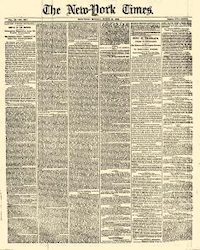The New York Times, June 19, 1860
Senator MASON has just wound up the Harper’s Ferry affair by presenting a majority report which reveals nothing, and by getting himself discharged from the manufacture of a bill to protect States from invasion. THADDEUS HYATT has also, at last, been released from his dungeon, and the country has thus been delivered from the horrors of civil war, with which Dr. CHEEVER threatened it. No complicity with JOHN BROWN has been brought home to anybody in the Republican Party. No organization for the invasion of Slave States has been discovered in the North, except the contemptible one which the unfortunate BROWN headed. Nothing has been fastened even upon GERRIT SMITH, WENDELL PHILLIPS or DR. HOWE. In so far, in short, as the inquiry was intended to damage the Republican Party, or even the Abolitionists, in the eyes of timid people, it has proved a miserable failure.
We were, of course, always satisfied that such would prove to be the case; but there is a lesson taught by the whole affair which cannot be too strongly impressed upon the public mind. The conduct of the Democratic party ever since the John Brown affair, has been painfully indicative of the rapidity with which positive ferocity is permeating our political controversies. There could not be a better proof of the wisdom of the founders of our Government, in striking acts of attainder from the list of punishments for political offences, than the events of the last eight months, though we feel satisfied that none of them ever imagined that any such proof would be furnished within the first century of our national existence. To judge from the language and conduct of Pro-Slavery politicians at the North, as well as the South, ever since the John Brown raid, one might fairly conclude that they were no longer content with merely political victories, but sought the notion that NAPOLEON III has ever seriously cherished an intention of securing that crown for any member of his own family, is just as gratuitous, and indeed just as absurd, as the kindred notion which was so sedulously disseminated by the English Press a year ago, that France was intriguing to erect Etruria into a kingdom for the Prince NAPOLEON and the Princess CLOTILDE. Austria has plainly signified her indisposition to step beyond the quadrilateral in Italy. Her inability to do so needed no diplomatic certificate. She would probably protest against the annexation of Naples and Sicily, as she has already protested against the annexation of the Northern and Central Duchies mind a foregone conclusion of their guilt, and the inquiry was opened in the Senate, in a spirit of savage eagerness, in order to obtain, if possible, legal proofs of complicity in the most horrible crimes known to public law.
We do not say that all those who took part in this unworthy crusade meant what they said, or that if the matter had been brought home to them as a tangible and probable issue, they would have anticipated the execution of SEWARD and GREELEY and GERRIT SMITH with satisfaction. But the spirit which does really gloat over the ruin and suffering, and even death, of a political enemy, is one which is cultivated and encouraged by the reckless use of ferocious and truculent language. There is in human nature a well known tendency to desire, and even to realize, that on which the mind dwells, and about which the tongue wags. We begin by abusing people and slandering them, and we end by really hating and destroying them. The first man a tiger kills, he kills in a rage and in self-defence; but the second and third are killed to be eaten. Nothing is easier of development in any of us than tigerish instincts.
At such political crises as that on which we are entering, charity is not simply a Christian virtue, but it is highly expedient; and the feeling itself can in no way be so well cultivated as by the habitual use of moderate language, and by the exercise of great caution in charging people with atrocious offences. The vicissitudes of political life in democratic countries are proverbial. The victors of to-day may be the vanquished of to-morrow; and there is no man in public life who may not any day find cause to remember with thankfulness that all his controversies with his opponents have been conducted in a generous, gentlemanly, Christian spirit.
